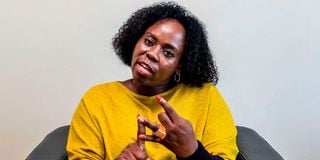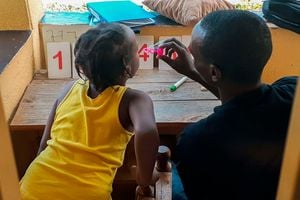
Jaki Mathaga, the founder of Arthur’s Dream Autism Trust Foundation, during an interview on March 27, 2024, in Nairobi.
When speaking publicly about her son, Jaki Mathaga only refers to him as King A.
“I haven’t sought consent to say his name or have his picture shown somewhere,” she says. She hopes that one day her son will be able to tell his story, ‘his own way.’ Until then, Jaki tells her son’s story from what she refers to as a secondary perspective.
As is norm with any first pregnancy, Jaki attended her clinics religiously and did everything the doctors told her to. She had a normal delivery and her son hit all his baby milestones. He ran across the room before his first birthday and there were no indications that something was amiss in his growth.
“I had huge dreams for him, president of the nation even! And with a mother like me, why wouldn’t he achieve them?” Jaki beams. At two years, however, she noticed her son’s bubbliness slowly disappear, replaced by frequent meltdowns as he struggled to get his message across.
Some people told her boys talk later than girls and that she need not worry. She, however, started to slowly notice signs she would later learn were associated with children on the autism spectrum. King A would only want to eat plain white rice, he would walk on his tippy-toes and was extremely sensitive to some fabrics. Jaki would have to snip the tags off his t-shirts. Still, no doctor had mentioned the autism.
To learn more about her son’s condition, she started her now life-long quest for knowledge.
“The internet can be a rabbit hole, and one thing can lead to another [and to] a very hopeless situation,” Jaki recounts. When she finally put a name to autism, the journey to acceptance began.
“I started looking for others like me,” she says.
At that point, she knew no one in Kenya that had an autistic child, so her search was international and on the inter-webs. In those early years, she even took a trip to the US to talk with other parents who were in the same boat as she was.
Dawn of advocacy
When King A was seven, Jaki took him to New York for the Son-Rise Programme, a forum for children with autism. Inside the hall of the facility that runs this venture, there are miniature flags in honour of all the nationalities that have taken their children there.
“In the middle, there was the Kenyan flag, which meant Kenyans have been going privately but nobody was talking to the other,” Jaki says as she tells of her journey to find the autism community on her return home.
She found one parent, and then another. She then decided to formalise and register the ADAT Foundation (Arthur's Dream Autism Trust) in 2016 with one of the pillars being access to education for children with autism, an issue which had affected her when trying to get an education for her son.
“I didn’t want to just do Facebook advocacy,” she points out. She took the conversation from WhatsApp and Facebook groups, from an online platform to meeting one another, which gave rise to Through the Roof, a platform for parents with autistic children to network and gain access to resources. To date, they have 1,600 members.
“Over the years, I’ve realised that I’ve known about the resources I needed because another parent knew where they were,” Jaki says of the power of the network.
Shoulder to cry on
Despite starting as a forum for children with autism, the ADAT Foundation has grown to now include services to those living with all forms of disability. Jaki speaks of the evolution, “It morphed. Because when I started doing advocacy for education, for example, I found that the issues that we were facing trying to advocate for inclusion were not just autism issues. There were other disability issues.” She could not advocate for one group and exclude the others.
Her platform initially gives parents a shoulder to cry on and then as time goes on, a tribe, bonded by common issues which cut across ethnicity and economic ability, the commonality of parenting children with disability.
Touch of care
How do you treat an autistic child at triage? What of a child who is scared of the ‘dreaded’ white coat the doctor wears? These are some of the questions Jaki and others found themselves dealing with during their children’s hospital visits. Sometimes, she says, “Doctors wanted to deal with the disability and not what took the child to hospital!”
Going to the hospital can be scary for anyone, let alone a child with a form of disability. Jaki has posed these questions to the healthcare sector. Does a doctor really need to wear a white coat to treat a child? Could the child be in a room where the doctor then visits to consult? Could we get practice visits? With regards to the last question, she refers to the practice of a parent being able to have their child get accustomed to the hospital environment over several visits, which will help deal with the real or imagined fear of being pinned down for a medical check-up.
The message is indeed getting through according to Jaki. She recalls a dentist who allowed her son to visit severally but only charged a single consultation.
“We were permitted by somebody who was getting [a procedure] done for my son to see what was being done. They gave him a set of equipment to look at, to touch.” When it was King A’s turn to sit on the dentist’s chair, he was completely calm.
Wheels of justice
Access to justice for people, not only children, with autism as well as intellectual disabilities is also one of the pillars of Jaki’s advocacy, given the obvious challenge of communicating with authority when accused of a crime. She gives heartbreaking tales of victims stuck in mental institutions for years because someone sent them there for a mental assessment and forgot about them.
They even go as far as holding training sessions in police stations on how to handle a person with autism, one aspect of it being that some would be totally averse to being touched by someone they don’t know.
“How do we begin as a people to say, this child communicates differently? Will the police know when they encounter an unspeaking person, that the person is not being rude?” she poses.
Change from pulpit
Jaki has an interesting last approach in her defence of the rights of people with disability. “If the religious space was to change, everything would change,” she says. “If religious leaders made it their business to talk inclusion, to talk advocacy, to talk justice and to make sure that in their space this was happening, then what that means for me is that we would already have started towards acceptance as a community.”







